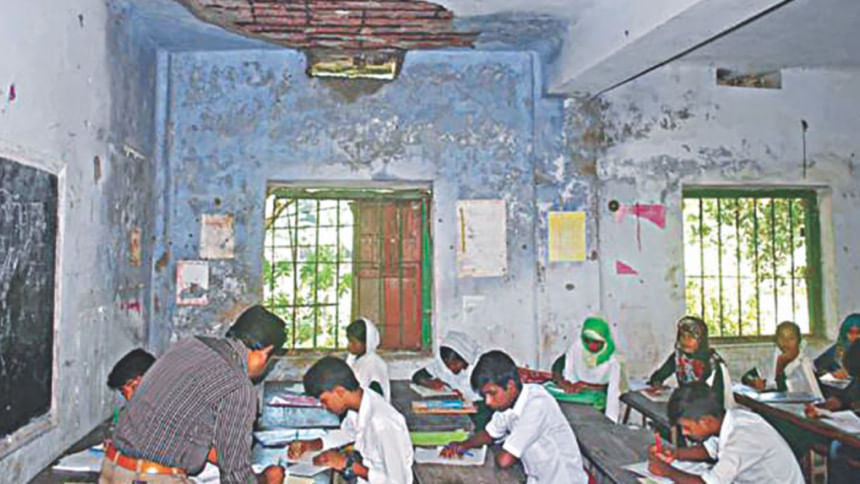The right to quality education

On December 10, 1948 the United Nations General Assembly adopted the Universal Declaration of Human Rights (UDHR). UN member countries have observed Human Rights Day on December 10 every year since its inception in 1950. It bears special significance for Bangladesh. The independence of Bangladesh in 1971 capitalised on the basic human right to self-determination. This day reminds us to stand up for our rights and those of others. All human rights enshrined in the UDHR are still relevant to us today.
Based on the demands of the present time, we need to set some priority areas, particularly the right to inclusive and equitable quality education (IEQE). It is not only a human right in itself but is also of paramount importance for the exercise of all other human rights. Due to its importance, sustainable development goal 4 (SDG 4) provides a detailed outline and set of indicators and targets in order to ensure IEQE. In defining IEQE, Unicef emphasises quality learners such as early childhood development; quality learning environments such as inclusive school environment and quality of infrastructure; quality content such as student-centred, non-discriminatory, standards-based curriculum structures; quality processes such as continuing support for student-centred learning; and quality outcomes.
Hence, it is crucial for us to realise the importance of IEQE keeping the needs of the next generation in sight. We have to advocate for ensuring IEQE because Bangladesh is under obligation to ensure IEQE as a UN member state as per the International Covenant on Economic, Social and Cultural Rights, Article 13 and UN Convention on the Rights of the Child, Articles 28 and 29. Our commitment has been reflected in Articles 15 and 17 of the Constitution, and other domestic laws and policies such as the Compulsory Primary Education Act, 1990; the Rights and Protection of Persons with Disabilities Act 2013; the Perspective Plan 2010-2021; Vision 2021; National Sustainable Development Strategy; and the Seventh Five Year Plan 2016-20.
However, evidence shows that despite the huge success towards increasing access to education and enrolment rates, in practice, Bangladesh still has much to do to ensure IEQE. Also, enormous gaps between laws and policies, and practice and implementation compound the challenge since domestic laws and policies have not yet adopted the principles of IEQE. Unesco's "Right to Education: Law and Policy Review Guidelines" asserts that "the right to quality education… cannot be achieved without strong national legal and policy frameworks that lay the foundation and conditions for the delivery and sustainability of good quality education."
But the provision of education stated in Articles 15 and 17 of the Constitution is still not justiciable, though many countries have constitutional provisions regarding the right to education and laws for implementation. If we look at India, we will find that in the 86th amendment of the Constitution in 2002, free and compulsory education for all children aged six to 14 has been included in the Constitution as a fundamental right. The Act makes it obligatory for the state to ensure that every child gets free elementary education. Unlike several other countries, the Indian Constitution does not stop at the inclusion of a provision but also makes the government accountable for ensuring that a child attends school. Even in the Philippines, the amendment to the Constitution declares that the state shall protect and promote the right of all citizens to quality education, at all levels, and shall take appropriate steps.
In the Compulsory Primary Education Act 1990, the coverage and quality remain poor. The "compulsion" aspect has not been well-publicised. In the Rights and Protection of Persons with Disabilities Act 2013, the minimum age for admission of students with disability to school should be raised in comparison to that for normal students. Special methods should be applied for the examination system of students with disabilities.
In the proposed Draft Education Act 2016, there is no mention of adequacy and efficiency of resources and budgets for education, or criteria and principles for education resource mobilisation and allocation. A rights- and equity-based education system, for example, requires public education resources to be allocated equitably, by applying certain criteria, among upazilas, proportional to the student population in each upazila.
In an article in The Daily Star titled "A New Education Law: Will it Help?", Professor Manzoor Ahmed wrote that the Act may be in conflict with the spirit and provision of the public and private universities' Acts, compromising self-regulation of universities. Although self-regulation and autonomy have not worked out as expected, the solution may not lie in handing more power to the bureaucracy in the ministry of education. Education policies in Bangladesh have not adopted IEQE. The National Plan of Action (NPA) takes a "needs-based" approach rather than a "rights-based" one, and, therefore, lacks the urgency and the commitment entwined with the latter. The scarcity of reliable and consistent data on the magnitude and educational status of marginalised children adds to the problem.
To ensure the right to inclusive and equitable quality education keeping SDG 4 in sight, the government and relevant stakeholders should take the following policy recommendations into consideration: (i) include human rights education in the national curriculum, from primary to tertiary, taking into account the requisites of a secure career in the digital age; (ii) revise proposed Draft Education Act 2016 in light of the principles of IEQE and pass it as soon as possible; (iii) implement the existing laws against child marriage and promote the education of the girl child in particular; (iv) implement the Bangladesh Persons with Disability Welfare Act 2001 and the Rights and Protection of Persons with Disabilities Act 2013 to make strides in ensuring inclusive education; (v) adopt the principles of IEQE in legal and institutional arrangements; (vi) amend the Constitution inserting "right to IEQE" provision as a fundamental right in Part III of the Constitution; and (vii) ensure accountability.
Muhammad Mahdy Hassan works at BRAC as policy analyst for advocacy for social change.
Email: [email protected]





Comments